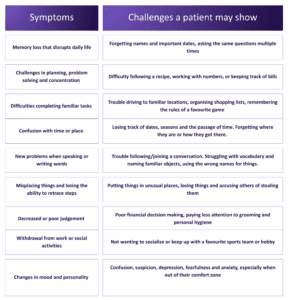In 1906, German physician Dr. Alois Alzheimer first described “a peculiar disease” – one of profound memory loss – which we now know as Alzheimer’s. World Alzheimer’s day takes place every 21st September to raise awareness and challenge stigma around Alzheimer’s disease. It is a global effort to support the 55 million people across the world who are living with this disease.
What is Alzheimer’s disease?
- A type of dementia (a decline in cognitive function that affects a person’s memory, thinking and behaviour).
- Microscopic changes within the brain begin long before the first signs of memory loss. This is known as ‘preclinical Alzheimer’s disease’.
- The brain is made up of billions of nerve cells (neurons) that work together to help us process and remember information.
- In Alzheimer’s disease, scientists have discovered that two key proteins found in brain cells, called beta-amyloid and tau, behave abnormally. Beta-amyloid builds up into sticky clumps (plaques) between the neurons, and tau forms twisted fibers (tangles) inside the neurons.
- These plaques and tangles disrupt the communication and function of the cells, causing them to die and leading to irreversible changes in the brain.
- Symptoms worsen over time and a person with Alzheimer’s lives 4-8 years after diagnosis on average, but can live as long as 20 years.(Alzheimer’s Society, 2025)
What are the symptoms of Alzheimer’s disease and how can these show up in daily life?

How is Alzheimer’s disease diagnosed?
There is no single test to confirm an Alzheimer’s diagnosis. Doctors use a combination of diagnostic tools, including a patient’s medical history, physical and neurological exams, cognitive and functional assessments, brain imaging, and cerebrospinal fluid and blood tests. (NHS, 2024)
What are the risk factors of Alzheimer’s disease?
- Age: Above the age of 65, a person’s risk of developing Alzheimer’s doubles about every 5 years.
- Sex: Twice as many women are affected by the disease than men (this is mainly due to women living longer than men on average).
- Genetics: There are certain genes that may be inherited from a parent that can affect a person’s chances of developing Alzheimer’s. People with Down’s syndrome have a much higher risk of developing Alzheimer’s disease because of a difference in their genes.
- Lifestyle: Keeping physically, mentally and socially active may help a person to reduce their risk of developing Alzheimer’s. Protecting the head from injuries may also reduce the risk.
- Health Conditions: Diabetes, stroke, heart problems, high blood pressure, high cholesterol, age-related hearing loss and depression. (Silva et al. 2019)
What treatments are available for those living with Alzheimer’s disease?
There are currently two FDA-approved medications prescribed to change disease progression (Donanemab and Lecanemab). A wide range of treatments can also be prescribed to Alzheimer’s patients to help with problems associated with the disease, such as depression, anxiety, sleep problems, delusions, hallucinations, incontinence and pain. Therapy and structured activities can also help patients to maintain their abilities and look after their physical and emotional wellbeing, such as Cognitive Stimulation Therapy, Talking Therapy and Music/Art Therapies. (Alzheimer’s Society, 2025)
What clinical research is being conducted?
Without clinical trials, there can be no better treatments, no prevention and no cure for Alzheimer’s disease. There are over 138 unique treatments being trialled across the world, recruiting Alzheimer’s patients. (Cummings et al, 2025) Brain donation plays a crucial role in advancing research on Alzheimer’s disease. A single donated brain can yield tissue for hundreds of research studies, which makes brain donation a valuable gift for researchers and future generations. (Alzheimer’s Society, 2025) In our 15 years of experience, Innovative Trials has supported over 60 neurology studies, including multiple Alzheimer’s studies. In a recent global Phase 3 study, our client evaluated relapse prevention in subjects with psychosis associated with Alzheimer’s Disease. Innovative Trials supported sponsor’s sites with in-country Recruitment Coaching and Site Support via local clinical enrollment managers (CEMs). Sites across 8 countries (Bulgaria, Serbia, Croatia, Germany, USA, Czech Republic, Italy and Spain) received up to 8 1:1 site coaching calls, and US sites also received HCP and Community outreach support to locations such as external Neurologists, Assisted Living Facilities and Memory Care Centres to help boost patient recruitment. In the time that sites received recruitment support from Innovative Trials, screening rates were increased by 62.4% and enrollment rates were increased by 80.2%. In certain countries like Bulgaria and Serbia, screening rates increased by 101.5% and 114.8% respectively, showcasing the importance of providing in-country patient recruitment and retention support.
References:
- World Alzheimer’s Month|Alzheimer’s Society (2025) https://www.alzheimers.org.uk/get-involved/world-alzheimers-month
- World Alzheimer’s Day is September 21, 2025|alz.org | Alzheimer’s Association (2025) https://www.alz.org/about/awareness-initiatives/world-alzheimers-day
- Risk factors for Alzheimer’s disease | Alzheimer’s Society | Alzheimer’s Association (2025) https://www.alz.org/about/awareness-initiatives/world-alzheimers-day
- Brain Donation | Alzheimer’s Association (2025) https://www.alz.org/alzheimers-dementia/research-and-progress/brain-donation
- Jeffrey L Cummings, Josie Lindle, Ibrahim Dalla, Yadi Zhou, Kate Zhong, Feixiong Cheng. 2025. Globalization of Alzheimer’s disease clinical trials: Current characteristics and future goals. International Psychogeriatrics. 2025 Jun 23:100108. doi: 10.1016/j.inpsyc.2025.100108 https://www.intpsychogeriatrics.org/article/S1041-6102(25)00346-1/fulltext
- Marcos Vinícius Ferreira Silva, Cristina de Mello Gomide Loures, Luan Carlos Vieira Alves, Leonardo Cruz de Souza, Karina Braga Gomes Borges & Maria das Graças Carvalho. 2019. Alzheimer’s disease: risk factors and potentially protective measures. Journal of Biomedical Science volume 26, Article number: 33 (2019). https://jbiomedsci.biomedcentral.com/articles/10.1186/s12929-019-0524-y
- Diagnosis Alzheimer’s disease. 2024. NHS. https://www.nhs.uk/conditions/alzheimers-disease/diagnosis/
